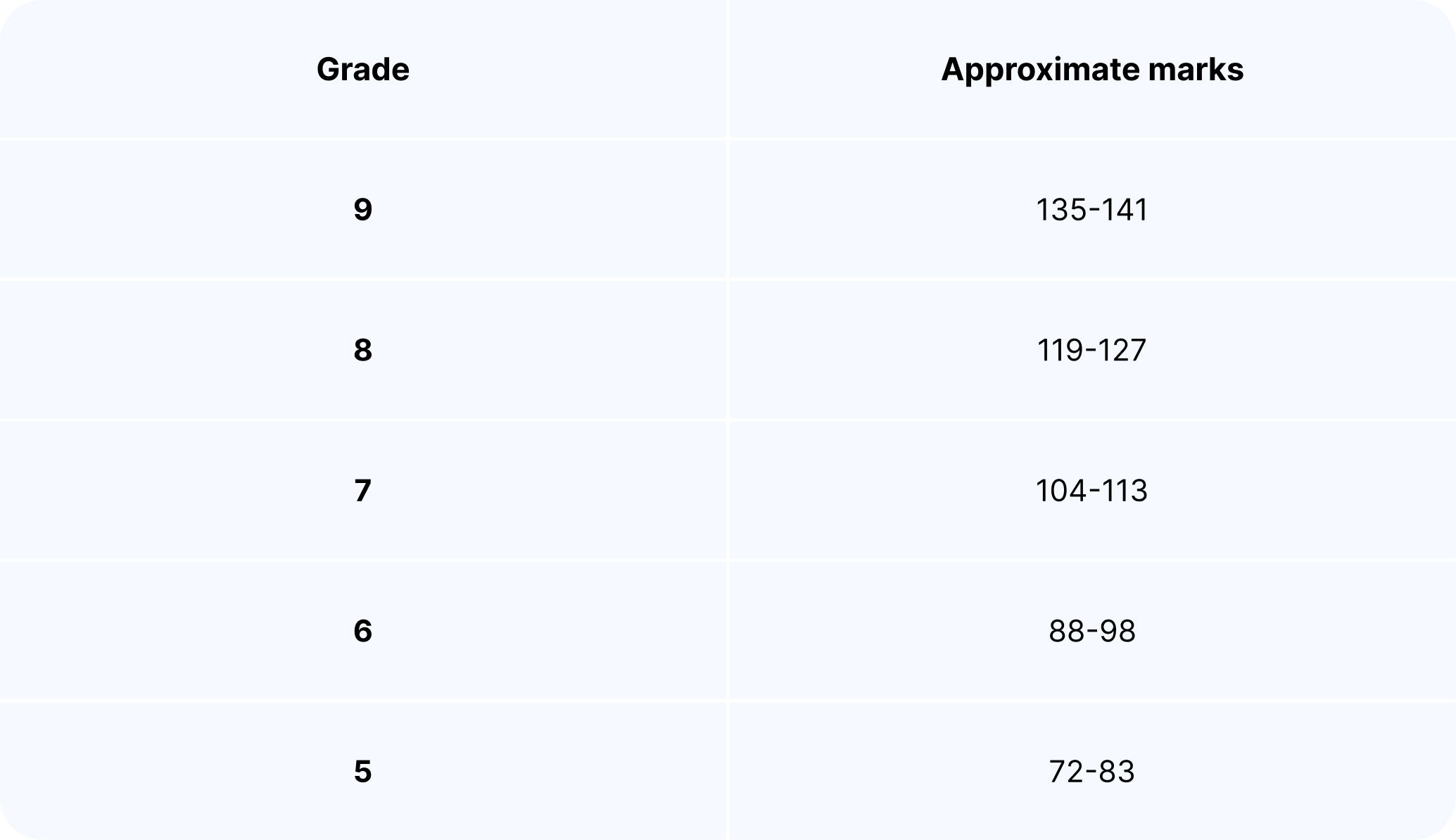Everything you need to know to ace AQA GCSE English Literature
By Atom | Oct 24, 2025, 9:30 AM
Contents
Tackling AQA English Literature GCSE? Take a look at our guide to the AQA exam to get prepared.
Whether you’re just starting Year 10 or preparing to sit your final exams, understanding the format of the papers, what examiners are looking for and what marks you might need to get your target grade will help keep your revision on track.
Not sure which exam board your school uses? Take a look at our guide to finding out which exam board you’re studying.
Key takeaways:
There are two written papers for AQA English Literature GCSE, with Paper 2 counting towards a higher percentage of your final grade.
You’ll have four set texts to study for the exam, but you won’t be able to bring them into the exam hall on the day.
GCSE grade boundaries are set after the exam. Take a look at last year’s boundaries below.
What’s the format of the AQA GCSE English Literature exam?
The AQA English Literature exam consists of the following:
Two closed-text written papers, which means you can’t bring the exam texts into the exam hall with you.
Paper 1 will last 1 hour and 45 minutes, and Paper 2 will last 2 hours and 15 minutes.
Paper 1 is worth 64 marks and Paper 2 is worth 96 marks.
The total available marks are 160.
The papers contribute 40% (Paper 1) and 60% (Paper 2) of your final grade.
You will be tested on four set texts, which must include a Shakespeare play, a 19th-century novel, a post-1914 play or novel, and a poetry anthology.
Free revision timetable template & more
Less stress, more success! Get your free revision timetable templates and guide to effective revision today. Because great revision starts with a solid plan.
What’s the difference between Papers 1 and 2 for AQA English Literature?
The two papers will test you on two of your set texts each. They are not equally weighted and are worth a different number of marks each. Take a look at this breakdown for more.
Paper 1: Shakespeare and a 19th-century novel
Paper 1 is split into two sections: the first tests you on Shakespeare, and the second on a 19th-century novel.
Section A: Shakespeare
You’ll be asked one question based on a printed extract from the play, where you’ll need to do a close reading of the extract, then relate it to the wider play.
Section B: 19th-century novel
You’ll be asked one question based on a printed extract from your set novel, plus a question that invites analysis of the novel as a whole.
Take a look at the AQA English Literature Paper 1 from May 2024 to learn more.
Paper 2: Post-1914 play or novel, and poetry
Paper 2 focuses on your other two set texts: a post-1914 play or novel, and a poetry anthology.
The paper is split into three sections, which consist of:
Section A: Modern novel or play
You must answer one essay question on your studied modern text.
This question is not extract-based; it asks you to explore themes, characters, and methods from the whole text.
Section B: Poetry anthology
You must answer one comparative question analysing a new ‘unseen’ poem with another poem from your chosen anthology.
Section C: Unseen poetry
You must analyse an unseen poem provided in the exam booklet.
You will then be asked to compare the unseen poem with a second unseen poem, looking at the similarities, differences and poetic devices used.
Take a look at the AQA English Literature Paper 2 from May 2024 to learn more.
What are examiners looking for?
The questions are asking you to show your knowledge of the texts and wider contexts.
Examiners are looking for a detailed, clear analysis of the texts and a well-structured argument.
You’ll gain marks for supporting your arguments with evidence, such as quotes.
You should be analysing language, structure, and form, and showing your understanding of the wider context of the novel, play or poem.
It’s also important to show you can compare and contrast texts and show your own opinions on them, too.
Find out more about what examiners are looking for by taking a look at previous AQA GCSE English Literature mark schemes.
What are the grade boundaries for AQA GCSE English Literature?
It’s important to remember that the exact grade boundaries for your GCSE exams will change every year. Exam boards adjust the grade boundaries after an exam has happened, depending on how advanced the exam content was and how the cohort performed.
This is so students don’t have an advantage or disadvantage because of the year they took the paper. For example, if your paper were harder, grade boundaries would be lowered so that a grade 5 reflects the same level of knowledge as in previous years.
To give a sense of what to expect, here’s a summary of the grade boundaries for the last few years for AQA English Literature GCSE:

It’s worth noting that in the last two years, grade boundaries have hovered closer to the lower end of the scales above. While we can’t say the exact boundary for the next exam, these figures should give you an idea of what to aim for.
*Table not including 2022, where the total marks available were lower.
What are the core texts for AQA English Literature?
The set texts for AQA are periodically reviewed, but as of the 2024 specification, they are currently:
Shakespeare
Macbeth
Romeo and Juliet
The Tempest
The Merchant of Venice
Much Ado About Nothing
Julius Caesar
19th-century novel
Great Expectations by Charles Dickens
Jane Eyre by Charlotte Brontë
Pride and Prejudice by Jane Austen
The Strange Case of Dr Jekyll and Mr Hyde by Robert Louis Stevenson
A Christmas Carol by Charles Dickens
Frankenstein by Mary Shelley
The Sign of Four by Arthur Conan Doyle
Post 1914 novel or play
Plays:
An Inspector Calls by J.B. Priestley
Blood Brothers by Willy Russell
The History Boys by Alan Bennett
DNA by Dennis Kelly
The Curious Incident of the Dog in the Night-Time (play version)
Novels:
Lord of the Flies by William Golding
Animal Farm by George Orwell
Never Let Me Go by Kazuo Ishiguro
Anita and Me by Meera Syal
Pigeon English by Stephen Kelman
My Name is Leon by Kit de Waal
Telling Tales (a short story anthology)
Poems past and present (1789-present)
One selection of poems from the AQA poetry anthology on one of three themes: love and relationships, power and conflict, worlds and lives (first exam 2025)
The anthology includes 15 poems per theme.
Your school will choose one set text from each category in advance of the exam and teach it in detail throughout Year 10 and 11, preparing you for the exams.
How can I prepare for GCSE English Literature?
Here are 5 top tips for preparing for your GCSE English Literature exams:
1. Know your set texts
The key area that GCSE English Literature tests is your knowledge and understanding of your set texts.
Read and re-read each of your set texts, noting key themes, passages and characters.
Make summary sheets for each of the key themes, characters, context, and quotes.
Learn a selection of short, powerful quotations per text, aiming to cover the key themes that may come up on the exam.
Watch theatre or film adaptations to expand your understanding, but always compare them to the original text.
Top tip: Try teaching others what you know about a text to help build confidence in your understanding.
2. Practise writing little and often
English Literature exam questions are asking you to write clear and comprehensive answers.
Practise writing PEE/PEEL paragraphs (Point, Evidence, Explain, Link) as a clear way to structure your thoughts.
Use past papers and practise writing answers under timed conditions.
Focus on analysing the text, not just retelling the story. Think about how language, structure, and form create meaning.
Get feedback from your teacher to refine your essay writing technique.
Top tip: Use practice papers under timed conditions to get used to planning and writing clear answers.
3. Don’t forget to revise the wider themes and context
Literature doesn’t exist in isolation. All your set texts relate to the time they were written; examiners will want to see your knowledge of wider issues at play.
Identify what each text says about society, morality, gender, power, class, love, conflict, etc.
Link these to the historical and cultural context of the piece, for example, the use of Victorian morals in Jekyll and Hyde.
Create theme maps showing how different characters and events connect to key ideas.
Top tip: Colour code your notes to help organise your thoughts and make them easier to digest.
4. Practise with new poems and extracts
Testing your skills with past papers is a great way to build speed, accuracy and confidence.
For unseen poetry or extracts, practise reading and annotating quickly
Ask yourself: What’s the tone? What’s the main message? How does the writer create mood or tension?
Then write short comparative responses to your set texts.
Top tip: You can find examples of extracts or poems in AQA past papers to practise with.
5. Mimic test conditions
Set yourself up for success by practising in exam conditions to get used to working quickly and with full focus.
Try to sit a full paper under timed conditions, without your notes or texts.
Afterwards, mark your own work using the AQA marking criteria or swap with a friend and mark each other.
Reflect on the process: How did you manage your time? Did you plan before writing? Did you include enough quotations and analysis?
Top tip: Break down each question into chunks and set yourself enough time to answer each section.
For more revision top tips, check out our blog on GCSE study habits to build.
There we have it - your guide to AQA English Literature GCSE. Now that you understand how the paper will be structured and marked, you can focus your revision on nailing exam technique.
Don’t miss Atom’s GCSE giveaway!

Six months. Six epic prizes. Six chances to make the GCSE season unforgettable.
We’re launching Atom for GCSE prep in 2026, and to celebrate, over the next six months, we’re giving away thousands of pounds worth of prizes to help your child level up their GCSE revision.
Here’s a taste of what’s up for grabs:
The latest Apple tech, including an iPad Air, Vision Pro and more
Festival tickets for Boardmasters and Reading 2026
Europe interrail passes and £1,000 spending money
…and that’s just a few of the amazing prizes available.
Our first two winners have already taken home incredible prizes! Find out who they are and what they won in our latest giveaway update and keep an eye out for news of our November winner.
It’s free to join. UK only. Full T&Cs apply.
Contents
